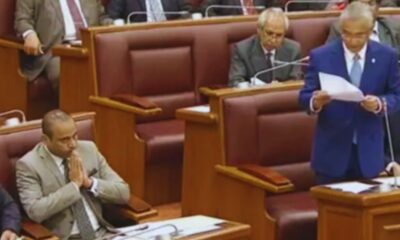The US House of Representatives passed a bill on Wednesday-March 14th that would ban TikTok in the United States if the social media platform does not sever ties with its parent company, ByteDance, and more broadly with China.
This is a major development for the platform, although the outcome of the upcoming vote in the Senate remains uncertain.
In response to this threat, the CEO of TikTok, Shou Zi Chew, urged its 170 million US users to speak out. “Make yourselves heard,” he declared on TikTok and X after the vote, less than eight months before the November presidential election.
TikTok has been under scrutiny by US authorities for several months, with many officials believing that the short video platform allows Beijing to spy on and manipulate citizens.
The company has repeatedly denied transmitting information to Chinese authorities and stated that it would refuse any potential requests to do so.
The bill, passed by a large majority of 352 votes out of 432 lawmakers, “does not ban TikTok,” argued the lead Democrat in the House of Representatives, Hakeem Jeffries, who voted in favor of the proposal.
“It aims to address legitimate national security and data protection concerns related to the Chinese Communist Party’s ties to a social network,” he explained in a statement.
“This process was conducted in secret and the bill was rushed for a reason: it’s a ban,” a TikTok spokesperson told AFP. “We hope the Senate will consider the facts, listen to its constituents, and understand the impact (of a ban) on the economy.”
“The vote today, which brought together lawmakers from both parties, demonstrates Congress’s opposition to attempts by the Communist China to spy on and manipulate Americans and is a sign of our resolve to deter our enemies,” declared the Republican House Speaker, Mike Johnson.
Ahead of the vote, China warned that a ban would undermine “the confidence of international investors” and would, for the world’s largest economy, be “shooting itself in the foot,” according to a Chinese foreign ministry spokesperson, criticizing the “intimidation” against TikTok.
The fate of the bill is uncertain in the Senate, where prominent figures oppose such a radical measure against an extremely popular application.
The Democratic Senate Majority Leader, Chuck Schumer, simply acknowledged the vote on Wednesday, refraining from commenting on the bill. President Joe Biden stated that if the bill is adopted in the Senate, he would sign it into law.
The bill would require ByteDance, TikTok’s parent company, to sell the app within 180 days, or else it would be excluded from Apple and Google’s app stores in the US. No potential buyer has officially come forward yet.
The Wall Street Journal reported that former Activision Blizzard CEO, Bobby Kotick, had shown interest in acquiring the app from ByteDance’s co-founder, Zhang Yiming.
The value of TikTok is difficult to assess, especially in the case of a forced sale. In 2020, ByteDance set its price at $60 billion when the Trump administration wanted to force its divestiture, according to Bloomberg.
Several US states and the federal government have banned the use of the app on official employees’ devices, citing national security risks. Shou Zi Chew is in Washington, seeking support to block the bill.
Former President Donald Trump reversed his stance on Monday, stating his opposition to a ban, primarily because it would benefit Meta, the owner of Instagram and Facebook, which he called the “enemy of the people.”
In 2020, the real estate developer, then US President, had attempted to acquire control of TikTok from ByteDance before being prevented by US courts.
Trump denied accusations that he changed his stance because a major TikTok investor, Jeff Yass, threatened to stop funding Republican electoral campaigns.
Other attempts to ban TikTok have also failed, with a bill proposed a year ago not coming to fruition, mainly due to concerns about freedom of speech.
Regarding the current proposal, Democratic House member Ro Khanna stated, “It’s too broad of a bill that won’t withstand scrutiny under the First Amendment of the US Constitution, which guarantees freedom of speech.”
A law passed in May by the state of Montana to ban the platform was suspended by a federal court in November on the grounds that it violated constitutional rights to freedom of speech.
“The other issue is that many people make a living from this platform in the US,” Ro Khanna added to journalists.
Source: Le Mauricien












